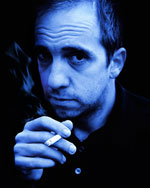Magnetic Fields ≠ Lyric Theatre, London. June 12th 2004.

Magnetic Fields have always explored and played with the whole notion of genre very well. Itís always been part of the charm of their records. So there was the Spector Pop of Holiday, the travelling country theme of the Charm Of The Highway Strip, the intentional Ďcompilation albumí theme of Get Lost, and of course the exuberantly mixed bag of styles that was 69 Love Songs. And on record it works. Even (especially?) on those albums like Highway Strip where a single genre is explored, things never get dull. Thatís thanks largely of course to the fact that the pace changes throughout the album, even if the overarching style doesnít. We go fast, we go slow, we go up, we go down. It was naturally most evident on that 69 Love Songs set, which translated into the live experience so magnificently, those double night events at the Lyric (in, was that really 2001?!! Time slips from me so quickly) working so well because there was the scope to expand and contract, take in all the nuances.
Back again in the Lyric however, and the four piece Magnetic Fields either do not have that scope or are disinterested in exploring it. Thatís fair enough of course; itís part of the scheme, that being to present a kind of Chamber Pop performance of our favourite Merritt masterpieces. On one level of course itís a grand idea, and no different in conception to, say, that Country feel of the Highway Strip. The difference is in the execution, for where as already mentioned the records dip and soar, these readings are instead uniform. The pace remains largely the same (a short step or two step on from funereal), the mood almost unblinkingly morose. And again, thatís fine in many respects, the interest then being in the detail and the subtle changes, itís justÖ Well, it pains me to say it, but itís just kind of dull.
The quartet play wonderfully of course. Thatís not an issue. Claudia, Stephin, John and Sam are gifted musicians who play with the necessary understated precision and warmth that the occasion demands. Claudia and Stephin, whilst not technically great singers, are great vocalists, and thatís really all that counts of course, so thereís no problem there either. The songs are terrific as well, but we already know what, donít we? I mean, we all take it for granted that Stephin Merritt is the best contemporary song writer in the world, donít we? Well, donít we? Merrittís songs are wonderful set pieces of Pop archaeology that play with reference, that are threaded through with knowing nods and winks. He has a way with words that most can only dream of; he treads the fine line of arch, literate lyrics that so few can manage without ending up sounding overblown or far too bloody clever for their own good. He also has a fine sense of humour.
And thereís another problem for you. Or, okay, another problem for me. I just read my article on those 2001 shows, and you know what? I said it there too. Thereís too many people laughing out loud, laughing like itís funny ha ha instead of funny tragic. Itís not even dark, black humour, but rather a gentle self-mocking sadness, like that found in the finest of the Peanuts strips. Stephin Merritt as a Pop Charlie Brown? Well, why not?
Having said that it is all one-dimensional, there are nevertheless highlights: ĎKissing Thingsí from the second 6ths album (sung in that instance by Sarah Cracknell) is a gem that really gains from this new reading, and itís a delight to hear the wonderful ĎSmoke And Mirrorsí from 1995ís Get Lost (still my personal favourite Magnetic Fields album). ĎThe Book Of Loveí is made for such a setting (Stephinís explanation of how Peter Gabriel is doing a cover version for a new J Lo movie gets a confused response - most seeming to think he is joking which leaves Stephin looking bemused and insisting Ďno, reallyÖí before Claudia joins in to explain the plot), and ĎPapa Was A Rodeoí is as always mesmerising, despite the too loud gut laughs from corners of the audience (and the by now traditional mirror ball trick might be corny as hell, but damn me if it doesnít work). ĎI Wish I Had An Evil Twiní similarly makes people dissolve in laughter, which is strange as it seems to me that the song is about the difficulties of living with desires and short-comings that conspire to cripple and as such is hardly hilarious, but what the hell do I know? Meanwhile ĎIs This What They Used To Call Loveí and ĎItís Only Time' are as fragile and magnificent as they are on the recent i album. But as excellent as these highlights are, somehow itís still not quite enough to break through the overall pall of politeness.
At the start of the show, as latecomers drift in, Claudia suggests that the band are starting to think they Ďarenít theatreí. Stephin meanwhile insists instead that they Ďare theatreí but that the audience just hasnít realised it yet. It reminds me of something I wrote recently about The Hidden Cameras; about how The Hidden Cameras understand the value of Theatre in Pop, but understand that this does not mean being pretentious and preciousÖ The Magnetic Fields, on this experience at least, seem in danger of missing that point and risk disappearing into the hole of worthy, well crafted but ultimately dull music for middle class musicians and broadsheet journalists. Letís hope thatís not the case, and letís hope too that their forthcoming Royal Festival Hall appearance rekindles some of the immense breadth and depth the group are capable of.
© 2004 Alistair Fitchett